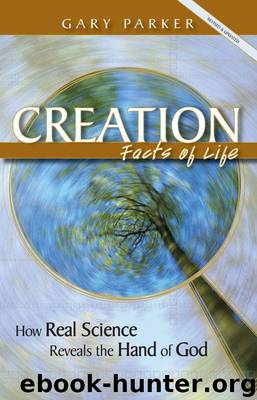Creation Facts of Life by Gary Parker

Author:Gary Parker
Language: eng
Format: mobi, epub
Tags: RELIGION / Religion & Science
Publisher: Master Books
Published: 2011-05-15T16:00:00+00:00
Variation, Yes; Evolution, No
I have been saying, perhaps too often, that the weight of evidence points to "variation within the created kinds." Do I really mean that all the tremendous variety we see today was built right into the created kinds? Could there be enough variation in two created human beings, for example, to produce all the variation among human beings we see today?
Answer: "Yes, indeed; no problem!" I get some help here from an unexpected source, evolutionist Francisco Ayala.57 He says that human beings are "heterozygous" for 6.7 percent of their genes on the average. That means that 6 or 7 times in 100, the pair of genes for a given trait differ, like the genes for free or attached ear lobes, or for rolling or not rolling the tongue. Now this may not seem like much, but Ayala calculates a single human couple with just "6.7 percent variety" could produce 102017 children (mathematically, not physically!) before they would run out of variation and have to produce an identical twin. That's a 1 followed by 2,017 zeroes! The number of atoms in the known universe is a mere 1080, nothing at all compared with the variety that is present in the genes of just two human beings!
Take human skin color, for example. First of all, it may surprise you to learn that all of us (except albinos) have exactly the same skin-coloring agent. It's a protein called melanin. We all have the same basic skin color, just different amounts of it. (Not a very big difference, is it?) How long would it take to get all the variation in the amount of skin color we see among people today? A million years? No. A thousand years? No. Answer: just one generation!
Let's see how that works. The amount of skin color we have depends on at least two pairs of genes. Let's call these genes A and B. People with the darkest skin color have genes AABB as their genotype (set of genes for a trait); those with very light skins have aabb. People with two "capital-letter" genes would be "medium-skinned," and those with one or three such genes would be a shade lighter or a shade darker.
Suppose we start with two medium-skinned parents, AaBb. Figure 20 is a genetic square that shows the gene combinations in the children they could have. Less than half (only 6 of the 16 combinations) would be medium-skinned like their parents. Four each would be a shade darker or lighter. One in 16 of the children of medium-skinned parents (AaBb) would have the darkest possible skin color (AABB), while the chances are also 1 in 16 that a brother or sister will have the very lightest skin color (aabb). (For details, see Parker, Reynolds, and Reynolds.58)
The Bible doesn't tell us what skin color our first parents had, but, from a design point of view, the "middle" makes a great beginning. Starting with medium-skinned parents (AaBb), it would take only one generation to produce all the variation we see in human skin color today.
Download
This site does not store any files on its server. We only index and link to content provided by other sites. Please contact the content providers to delete copyright contents if any and email us, we'll remove relevant links or contents immediately.
The Five People You Meet in Heaven by Mitch Albom(3550)
The Secret Power of Speaking God's Word by Joyce Meyer(3170)
Real Sex by Lauren F. Winner(3013)
Name Book, The: Over 10,000 Names--Their Meanings, Origins, and Spiritual Significance by Astoria Dorothy(2978)
The Holy Spirit by Billy Graham(2943)
0041152001443424520 .pdf by Unknown(2843)
How The Mind Works by Steven Pinker(2811)
ESV Study Bible by Crossway(2773)
Ancient Worlds by Michael Scott(2681)
Churchill by Paul Johnson(2577)
The Meaning of the Library by unknow(2564)
The ESV Study Bible by Crossway Bibles(2548)
The Gnostic Gospels by Pagels Elaine(2527)
MOSES THE EGYPTIAN by Jan Assmann(2411)
Jesus by Paul Johnson(2352)
City of Stairs by Robert Jackson Bennett(2345)
The Complete Dead Sea Scrolls in English (7th Edition) (Penguin Classics) by Geza Vermes(2270)
The Nativity by Geza Vermes(2226)
Ancient Near Eastern Thought and the Old Testament by John H. Walton(2221)
